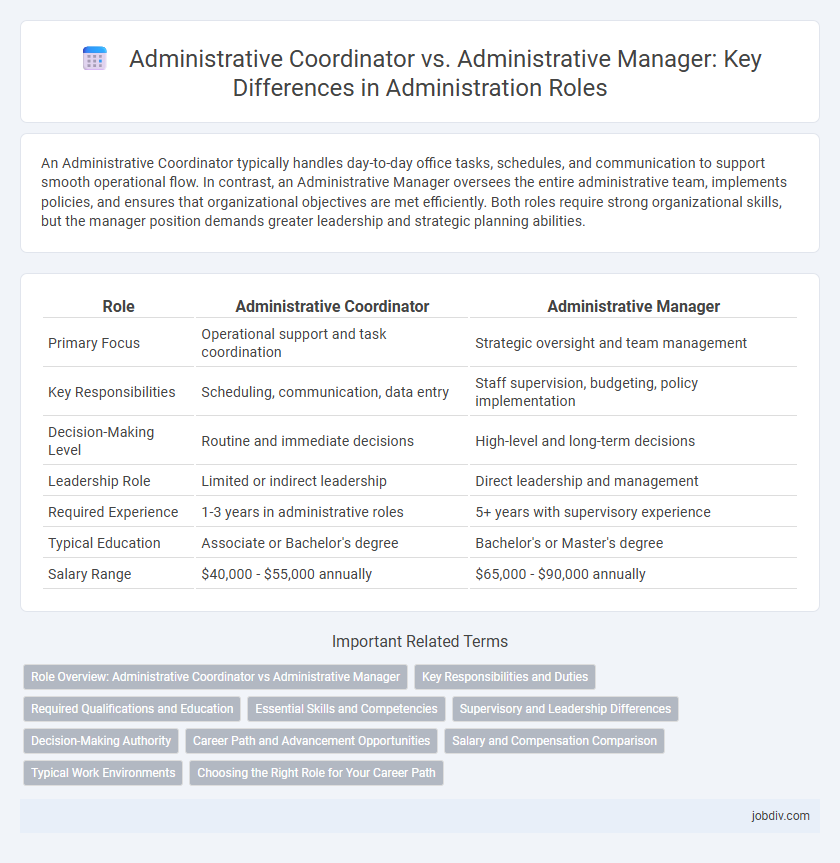An Administrative Coordinator typically handles day-to-day office tasks, schedules, and communication to support smooth operational flow. In contrast, an Administrative Manager oversees the entire administrative team, implements policies, and ensures that organizational objectives are met efficiently. Both roles require strong organizational skills, but the manager position demands greater leadership and strategic planning abilities.
Table of Comparison
| Role | Administrative Coordinator | Administrative Manager |
|---|---|---|
| Primary Focus | Operational support and task coordination | Strategic oversight and team management |
| Key Responsibilities | Scheduling, communication, data entry | Staff supervision, budgeting, policy implementation |
| Decision-Making Level | Routine and immediate decisions | High-level and long-term decisions |
| Leadership Role | Limited or indirect leadership | Direct leadership and management |
| Required Experience | 1-3 years in administrative roles | 5+ years with supervisory experience |
| Typical Education | Associate or Bachelor's degree | Bachelor's or Master's degree |
| Salary Range | $40,000 - $55,000 annually | $65,000 - $90,000 annually |
Role Overview: Administrative Coordinator vs Administrative Manager
An Administrative Coordinator primarily manages day-to-day office functions, schedules, and communication to ensure smooth operational workflow. In contrast, an Administrative Manager oversees broader organizational strategies, supervises administrative staff, and implements policies to enhance efficiency and productivity across departments. Both roles require strong organizational and leadership skills, but the Administrative Manager holds greater responsibility for decision-making and long-term planning.
Key Responsibilities and Duties
Administrative Coordinators focus on managing daily office operations, scheduling, and supporting communication between departments, ensuring smooth workflow and task completion. Administrative Managers oversee broader organizational functions, including staff supervision, policy implementation, and strategic planning to improve administrative efficiency and resource allocation. Both roles require strong organizational and communication skills, but managers hold greater responsibility for leadership and decision-making within administrative systems.
Required Qualifications and Education
An Administrative Coordinator typically requires a bachelor's degree in business administration or a related field, along with strong organizational and communication skills and 2-4 years of experience in office or project coordination. An Administrative Manager often demands a higher level of education, such as a bachelor's or master's degree in business management or administration, combined with 5+ years of leadership experience and expertise in strategic planning, budgeting, and staff supervision. Both roles benefit from proficiency in office software, but the Administrative Manager must demonstrate advanced skills in management systems and team leadership.
Essential Skills and Competencies
Administrative Coordinators excel in organizational skills, communication, and multitasking to support daily office functions effectively. Administrative Managers demonstrate leadership, strategic planning, and budget management competencies to oversee and improve administrative operations. Both roles require proficiency in problem-solving and technology, but managers prioritize team supervision and resource allocation for optimal efficiency.
Supervisory and Leadership Differences
Administrative Coordinators primarily oversee day-to-day clerical tasks and support functions, managing schedules and ensuring workflow efficiency without direct supervisory authority. In contrast, Administrative Managers hold leadership roles responsible for supervising teams, implementing policies, and driving organizational strategies to improve department performance. Their core difference lies in the scope of leadership, with managers focusing on personnel management and decision-making, while coordinators concentrate on operational support.
Decision-Making Authority
Administrative Managers possess higher decision-making authority, overseeing strategic planning and resource allocation across departments. Administrative Coordinators handle daily operational decisions, ensuring smooth workflow and supporting the implementation of managerial directives. The distinction lies in the scope and impact of decisions, with managers influencing organizational policies and coordinators focusing on tactical execution.
Career Path and Advancement Opportunities
An Administrative Coordinator typically handles day-to-day office operations and supports administrative staff, serving as an entry or mid-level position that offers exposure to organizational processes and project management. Advancement opportunities often lead to roles like Administrative Manager, which involves supervising teams, strategic planning, and higher-level decision-making responsibilities. Career progression from Administrative Coordinator to Administrative Manager enhances leadership skills and expands scope within administrative functions, increasing potential for senior management roles.
Salary and Compensation Comparison
Administrative Coordinators typically earn an average salary ranging from $40,000 to $55,000 annually, reflecting entry to mid-level administrative responsibilities. Administrative Managers command higher compensation, with salaries averaging between $65,000 and $90,000 per year, due to their broader scope of management duties and strategic oversight. Variations in salary are influenced by factors such as industry, company size, location, and individual experience levels.
Typical Work Environments
Administrative Coordinators typically work in office settings within corporate, healthcare, or educational institutions, where they handle scheduling, communication, and clerical support. Administrative Managers often operate in more strategic environments such as large corporations, government agencies, or non-profits, leading administrative teams and overseeing office operations. Both roles require proficiency in organizational tools and effective communication to ensure smooth office functionality.
Choosing the Right Role for Your Career Path
Selecting between an Administrative Coordinator and an Administrative Manager depends on your career goals and skill set specialization; coordinators focus on scheduling, communication, and task organization, while managers oversee teams, strategize operations, and handle higher-level administrative functions. Understanding the scope of responsibility and leadership skills required helps in making an informed decision aligned with long-term professional growth. Evaluate your preference for either detailed operational support or strategic management to choose the right administrative role for your career advancement.
Administrative Coordinator vs Administrative Manager Infographic

 jobdiv.com
jobdiv.com